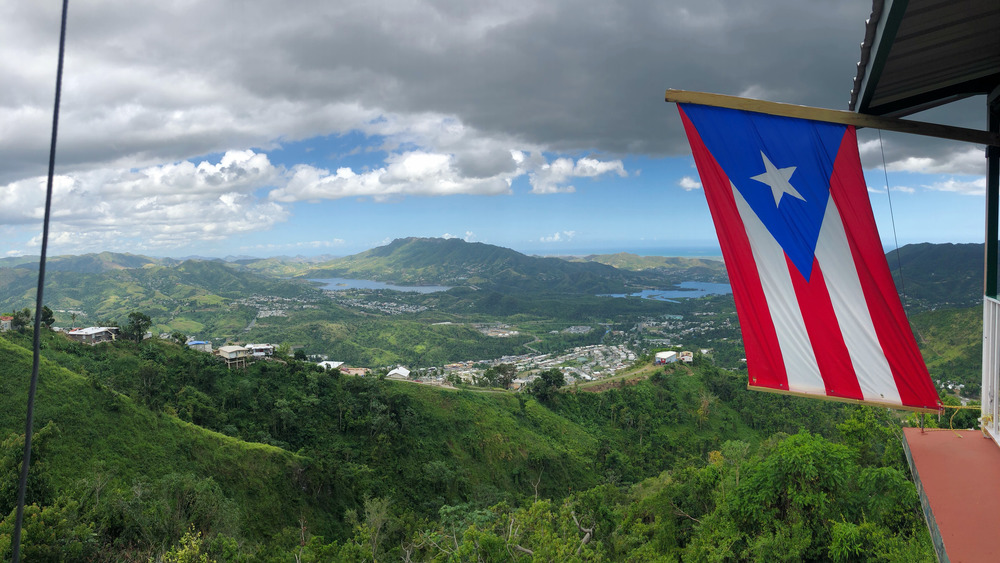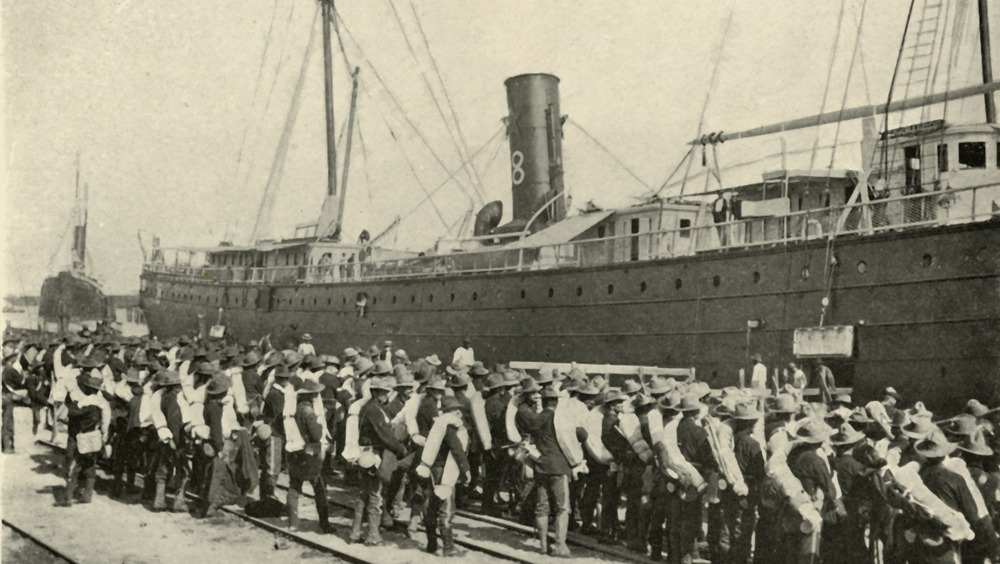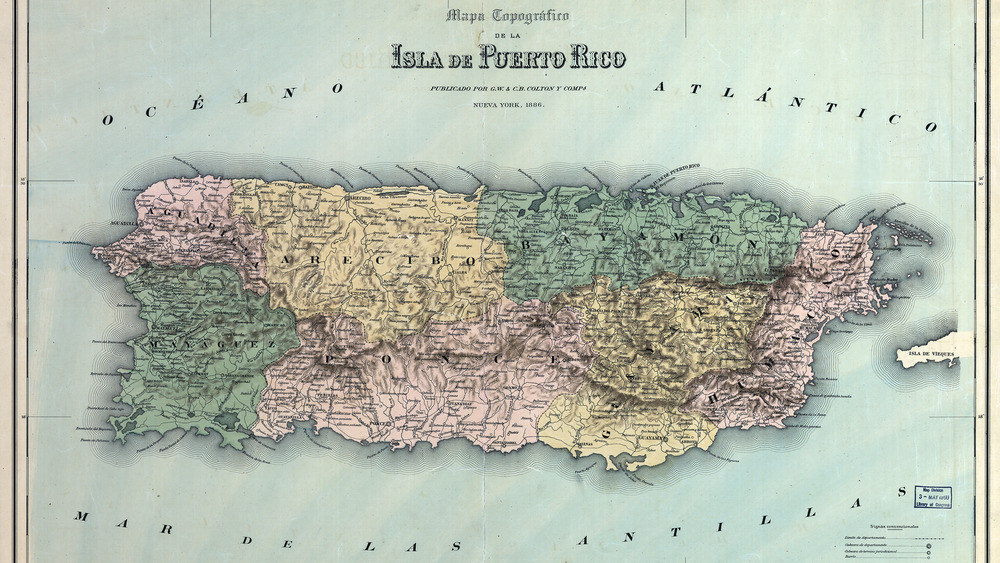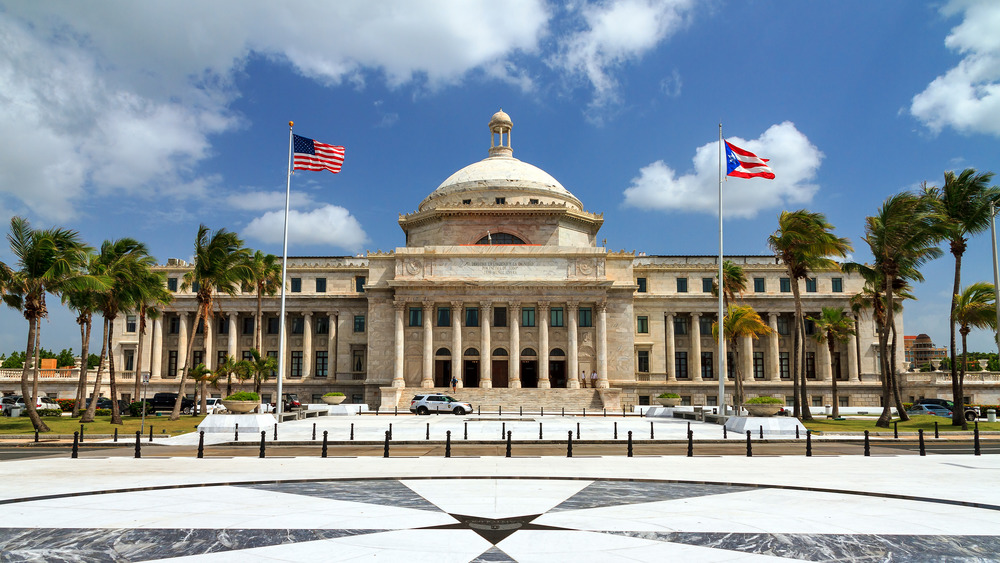How The United States Got Control Of Puerto Rico
Every American school kid learns that the United States is made up of 50 states. If you ever forget that fact, don't worry, you can always count the number of stars on the U.S. flag. But, in reality, America is more complicated than the flag implies; besides 50 states, the United States also possesses a number of unincorporated territories. With a population of over 3 million (per the U.S. Census), the island of Puerto Rico is by far the largest of America's non-state territories.
Puerto Rico has a vibrant history; its food, dance, and music have had a great impact on the culture of the continental United States. And yet, despite its influence, Puerto Rico is often sidelined in U.S. politics; as a territory, it lacks voting representation in Congress. So, let's consider how Puerto Rico came to be part of the United States, and why Puerto Ricans remain second-class citizens under American law.
As you likely already know, the island of Puerto Rico spent several centuries as part of the Spanish empire. You probably think of Spain as a cruel and oppressive colonizing regime — and, for the most part, you'd be correct. But, in February of 1898, History explains, Spain finally granted the island of Puerto Rico the ability to govern itself — "complete with a Constitution and voting rights." But Puerto Rican self-rule was to be short lived. Within one year, the United States would acquire the island as a non-voting territory.
The United States seized Puerto Rico from Spain in 1898
According to the Library of Congress, on April 25, 1898, the United States formally declared war on Spain. As the Encyclopedia Britannica explains, one of the chief causes of the war was the sinking of the USS Maine — a battleship explosion which American newspapers blamed on Spain. There wasn't much evidence for this claim, Britannica adds; the sinking of the Maine was likely used as an excuse for America to go to war to protect its economic interests in the Caribbean.
One of the major campaigns of the Spanish-American war was the U.S. invasion of Puerto Rico. Per History, the American government invaded Puerto Rico for two main reasons: to fight the Spanish, and to eventually establish a sugar market on the island. That second goal was kept under wraps; instead, the American army portrayed itself as the liberators of Puerto Rico. One American general decreed that America would "protect the life, liberty, and happiness of Puerto Ricans, and their property." Hearing this, many Puerto Ricans chose to side with the United States, and some even took up arms against Spain.
As another History article explains, American forces landed in Puerto Rico in July 1898, gaining control of the island by mid-August with only seven American deaths. By December of that year, the Spanish-American war had formally ended with the signing of the Treaty of Paris. That treaty handed control of Puerto Rico (among other territories) to the United States.
Puerto Rico has kept its designation as an 'unincorporated territory'
With Puerto Rico now under American control, many Puerto Ricans were excited to receive the freedom and democratic self-governance that they felt the U.S. government had promised them. Instead, per History, the United States dismantled Puerto Rico's local parliament and set up a new colonial system. Chief among America's goals was the establishment of a sugar economy on the island, and this modified economy displaced the existing coffee industry, sending many Puerto Ricans into poverty.
Now, when the United States had expanded West, it typically established "incorporated territories" that would later become states — like the Colorado Territory, for example. But, History explains, a series of 1901 legal opinions argued that former Spanish territories "were full of 'alien races' who couldn't understand 'Anglo-Saxon principles.'" So, as a result, Puerto Rico was designated an "unincorporated territory" with no path to statehood; Puerto Ricans, despite living under U.S. control, were not considered American citizens.
That ultimately changed in 1917, when the Jones-Shafroth act decreed that Puerto Ricans were indeed U.S. citizens. One of the main reasons for this act? The U.S. government wanted to be able to legally recruit Puerto Ricans to fight in World War I. However, Puerto Rico remained an unincorporated territory. As such, Puerto Rican citizens are still unable to vote in presidential elections, nor do they have voting representation in Congress.
The United States has declined giving Puerto Rico independence or statehood
Throughout the 20th century, Puerto Rico saw a variety of political movements that sought to win independence from the United States. But, per History, the U.S. government successfully suppressed these movements — sometimes through censorship and other times by imprisoning the movements' leaders. Then, in 1954, per the LA Times, four Puerto Rican separatists brought guns into the U.S. Capitol building, where they shot and injured five congressmen. The shooters spent over two decades in prison, but their sentences were commuted by President Jimmy Carter in 1979, per National Geographic.
In the 21st century, calls for Puerto Rican independence have mostly died down, but appeals for statehood have grown. While a sizable portion of Puerto Ricans prefer to remain an unincorporated territory — as it does come with upsides like lower taxes — most agree that the benefits of statehood are greater. As Vox explains, statehood would allow Puerto Ricans to vote for president, receive voting representation in Congress, and obtain greater economic support. As a result, a pro-statehood political party has swept Puerto Rican elections in recent years. In a 2020 referendum, per BallotPedia, 52.34 percent of Puerto Ricans voted in favor of statehood. Unfortunately, the votes of Puerto Ricans don't matter; only Congress can grant statehood to the island, per HowStuffWorks.
The idea of Puerto Rican statehood has picked up steam in recent years — both among the public and elected officials. But will it actually happen? Only time will tell.



